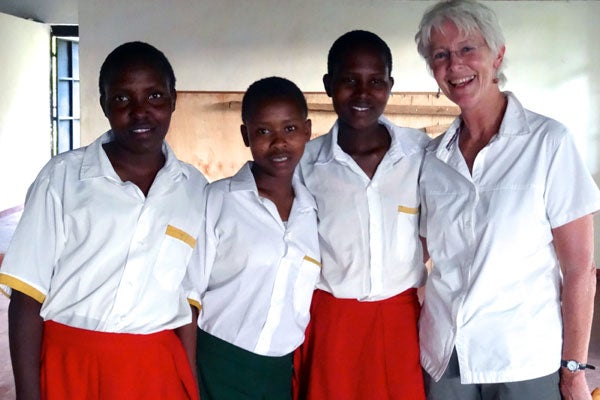
Building a school in Kenya with U of T Alumni Travel Program
Published: April 7, 2014
Volunteering was always part of Rosemary Tannock’s retirement plan but she never imagined she’d be building a school in Kenya just seven months after retiring from the Department of Applied Psychology & Human Development at the University of Toronto’s OISE.
“Personally it allowed me to do things I’d never done before like learning how to mix cement,” says Tannock. “Professionally it allowed me to look at their model of education where teachers are called facilitators and they use a cooperative/discovery learning model where the students do as much as they can on their own before consulting the adult.”
A former Canada Research Chair (2006 - 2013) in special education and adaptive technology at OISE, a senior scientist at SickKids and a professor of psychiatry at U of T, Tannock’s world pre-retirement was an exceptionally busy one. But when she attended an information evening for volunteer trips organized by U of T Alumni Travel Program with international charity and educational partner Free the Children founded by Craig and Marc Kielberger, Tannock was hooked.
She signed up for their Kenyan based Adopt-A-Village program, aimed at ending poverty through five pillars: education; water and sanitation; health; alternative income and livelihood; and agriculture and food security. Travelling to Nairobi in October 2013, Tannock joined a group of 17 other volunteers, most of whom were affiliated with the University professionally or as alumni. From here, they travelled by two tiny planes to the remote Bogani Cottages & Tented Camp in the south-west region of Kenya, known as the Masai Mara, where they would stay for the next two weeks.
 “I have never come across children who were so excited and motivated for learning even after walking 10 kilometers to school,” Tannock says. “Unlike Canada, no child has a sense of entitlement. The sheer joy of learning is omnipresent particularly with the high school girls.”
“I have never come across children who were so excited and motivated for learning even after walking 10 kilometers to school,” Tannock says. “Unlike Canada, no child has a sense of entitlement. The sheer joy of learning is omnipresent particularly with the high school girls.”
Sleeping in tents or stone cottages, the volunteers’ day began early with a six am walk on the savanna with one of the Maasai tribes who passed on interesting information about the local plant and animal life. Breakfast was followed by a bumpy bus ride to their work site where they spent the morning helping to build a dormitory for the first ever girl’s secondary school in the Masai Mara.
The group's tasks varied daily from cement mixing to mud flinging (strengthening inside walls) all learned from the Maasai and the Kipsigis.
Then it was back to the camp for lunch followed by cultural afternoons filled with activities such as meeting the local mothers, guided visits of their homes, cooperatives and land, discussing matters such as the challenges they now face because the girls are in school.
Another afternoon saw them at the girl’s secondary school where the pupils sang and danced for the volunteers, drank tea and discussed the girl’s future hopes and dreams.
“This is the first generation of girls to go on to secondary school,” Tannock says. “They want to be accountants and doctors but they have the extra stress of going home after school not only to homework but household chores too.”
Volunteers also visited the health clinic and the elementary school where they were just beginning to use electricity.
“I saw firsthand what an NGO can do as well as its limitations,” says Tannock. “For example I never saw any children with any disabilities so it’s not quite at the inclusion stage yet by comparison to South Africa.”
But Tannock says she was bowled over by the children’s unending enthusiasm.
“I’d never come across this collective singing they all engage in. All the children sing and dance without a single musical instrument. I’d never seen children seem so happy and free and so motivated for learning.”
Tannock would like to see Canadian schools follow the example of at least one aspect of education in Kenya: “Physical Education is part of their school day, everyday and the children are expected and required to help in the community.”
The hardest moment came upon leaving. “Because of the rapport we developed with the local people and the huge welcome we received, the toughest moment came when we had to say goodbye.”
She plans on another vacation with a difference as soon as time allows and hopes next time to work with an organization where she can use her professional skills and stay for a much longer period. To anyone considering such a venture she says, “Go, do it!”
Jennifer o'Reilly is a writer with OISE at the University of Toronto.



